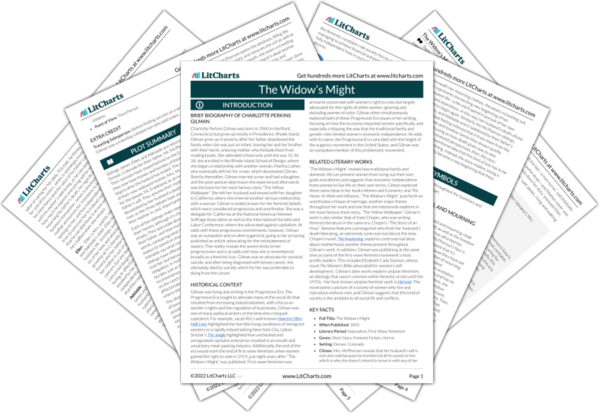Rather than death amounting to no more than a tragic sense of loss, “The Widow’s Might” suggests that the death of a loved one can actually give people new kind of freedom. Mrs. McPherson best illustrates this idea. In stark contrast to the sadness and devastation that her children expect will have consumed her in the wake of her husband’s death, Mrs. McPherson is joyful and excited to live an independent life now that she is free from her role as a wife and mother. When she throws off her borrowed black veil and the black mourning clothes she wore to her husband’s funeral, Mrs. McPherson reveals that her grief was a performance, a costume she wore to act out the emotional devastation that society expects of a woman when her husband dies. Underneath her mourning clothes, she wears a traveling suit, which represents the exciting new beginning of her independent life—a life she’ll spend in pursuit of her own dreams and aspirations. In this way, her husband’s death allows for her life to begin again. Similarly, the McPherson siblings, James, Ellen, and Adelaide aren’t saddened by their father’s passing, instead feeling relieved that it frees them from the childhood home and loveless family they always quietly despised. By focusing on how death gives way to new possibilities and renewed perspectives, then, the story challenges the conventional idea that this kind of loss has to be tragic and overwhelming. Instead, the story implies, losing a loved one can actually become a new beginning that frees rather than destroys.
Death, Loss, and New Beginnings ThemeTracker

Death, Loss, and New Beginnings Quotes in The Widow’s Might
“She had help toward the last—a man nurse,” said Adelaide.
“Yes, but a long illness is an awful strain—and Mother never was good at nursing. She has surely done her duty,” pursued Ellen.
“And now she’s entitled to rest,” said James, rising and walking about the room.
“I dare say it was safer—to have the property in your name—technically,” James admitted, “but now I think it would be the simplest way for you to make it over to me in a lump, and I will see that Father’s wishes are carried out to the letter.”
“Your father is dead,” remarked the voice.
“Yes, Mother, we know—we know how you feel,” Ellen ventured.
“I am alive,” said Mrs. McPherson.
“I have no children, Mr. Frankland. I have two daughters and a son. Those two grown persons here, grown up, married, having children of their own—or ought to have—were my children. I did my duty by them, and they did their duty by me—and would yet, no doubt.” The tone changed suddenly. “But they don’t have to. I’m tired of duty.” The little group of listeners looked up, startled.
“I’m going to do what I never did before. I’m going to live!”
With a firm swift step, the tall figure moved to the window and pulled up the lowered shades. The brilliant Colorado sunshine poured into the room. She threw off the long black veil.
“That’s borrowed,” she said. “I didn’t want to hurt your feelings at the funeral.”
She unbuttoned the long black cloak and dropped it at her feet, standing there in the full sunlight, a little flushed and smiling, dressed in a well-made traveling suit of dull mixed colors.
“If you want to know my plans, I’ll tell you. I’ve got $6,000 of my own. I earned it in three years—off my little ranch sanitarium. One thousand I have put in the savings bank—to bring me back from anywhere on earth, and to put me in an old lady’s home if necessary. Here is an agreement with a cremation company. They’ll import me, if necessary, and have me duly—expurgated—or they don’t get the money. But I’ve got $5,000 to play with, and I’m going to play.”
“Are you—are you sure you’re—well, Mother?” Ellen urged with real anxiety.
Her mother laughed outright.
“Well, really well, never was better, have been doing business up to to-day—good medical testimony that. No question of my sanity, my dears! I want you to grasp the fact that your mother is a Real Person with some interests of her own and half a lifetime yet. The first twenty didn’t count for much—I was growing up and couldn’t help myself. The last thirty have been—hard. James perhaps realizes that more than you girls, but you all know it. Now, I’m free.”
“Where do you mean to go, Mother?” James asked.
She looked around the little circle with a serene air of decision and replied.
“To New Zealand. I’ve always wanted to go there,” she pursued. “Now I’m going. And to Australia—and Tasmania—and Madagascar—and Terra del Fuego. I shall be gone some time.”
They separated that night—three going East, one West.











